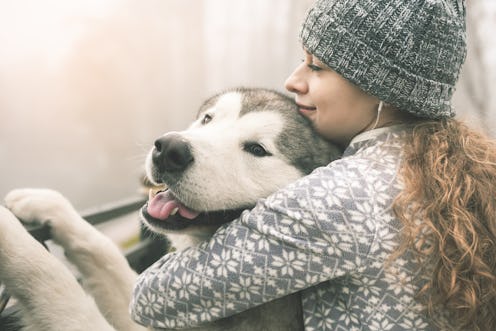Dogs, they're just like us. More accurately, you and your dog might share similar traits that your pup developed by being in your company, similar to how children learn to navigate the world by watching their parents. And, there are actually some personality traits your dog can inherit from you — not genetically, of course, by as a result of sharing your space. Case-in-point: Although my dog BiBi is a hardcore extrovert who gets excited about absolutely everything — which is not like me at all — she's also extremely stubborn, and suspicious by nature, just like me... which might not be a coincidence. A study published in the Public Library of Science found that pups pick up traits from their owners like coping and social skills.
What's more, dogs' cortisol levels actually fluctuate along with the cortisol levels of their humans during times of stress. "Neuroticism is linked to low expectations that social support will be forthcoming when needed, to major depression, and to anxiety. Dogs are sensitive to their owners' emotional states and emotional contagion between owners and dogs is possible," the study found. "Thus, dogs may mirror the anxiety and negative expectations of neuroticistic owners in their cortisol variability." So, if you're an anxious person, it's likely that you'll in turn have an anxious dog. If you're more of a go-with-the-flow type, your dog is likely pretty chill as well. Intrigued? These are some other personality traits you and your dog might share.
1
Coping Skills
If you have a type-A personality, it's likely that your dog does too. This is me and my dog all day: When she sees me telling one of my other pets "no," she takes it upon herself to try to enforce it, which usually creates chaos. "Agreeable owners are probably good at coping with social situations and hence at controlling social stress," the study explained. "This personality dimension is described as being cooperative, sympathetic, and considerate. [... ] In general, relaxed owners are likely to have relaxed and friendly dogs."
2
Confidence & Security
Just like their humans, dogs can feel anxiety too. "Attachment classification is known to predict sensitivity and reliability as a caregiver," the study explained. "Sensitive caregivers interact thoughtfully with the child and are aware of the child’s needs. Thus, owners low in sensitivity may be more likely to have dogs with an insecure attachment style than owners with a sensitive caregiving style. Dogs of the former are more stressed during an attachment assessment than securely attached dogs, and their owners are more likely to be insecurely attached toward them."
3
Whether Or Not They're A Morning Pup
Whether or not your pup is an early riser largely depends on whether you are a morning or a night person. While cats tend to march to the beat of their own drum and don't care if you want to sleep or not, dogs often mimic the behavior of their owners — so, chances are your pup will sleep as long as you do. This is certainly true for me and my dog. Unless she hears my roommate get up, she's content to snuggle and snooze as long as I want.
4
Bad Boundaries
Pups look to their people parents for guidance on how to behave. If you model bad behavior for your dog, or don't let your dog know how you want him or her to behave, your pup will likely develop bad habits. It turns out that failure to enforce boundaries for your dog could be a reflection of your own emotional issues. As Armando Morales wrote on the blog The Hyper Pup, "The idea that their dog may not view them in the best light possible could be emotionally troubling and stressful for them." Don't be afraid to set boundaries for your dog. Dog actually want a strong leader, and they're generally going to love you no matter what, even when you tell them no.
5
Feelings Of Fear
Whether or not your dog is afraid — which can manifest as aggression — largely depends on whether or not you're giving off feelings of fear. The New Scientist noted that dogs can actually smell fear in humans, which in turn can make the dog fearful too. Sometimes when your dog senses your fear they might feel the need to defend you, which can sometimes result in fear-related behavioral problems.
6
Social Preferences
Whether your dog loves being social or prefers a night at home with Netflix might depend on whether you are an introvert or an extrovert. The Chicago Tribune reported that a Natural Balance Doggie Character Survey found that 66 percent of extroverts had super social dogs, compared with 28 percent of introverts.
Perhaps if you get your dog as a puppy they are more likely to fully adopt your behavior. But, even if you adopt an older dog, your pup is definitely going to acquire several of your personality traits. Kind of like all of the Instagram videos of dogs doing yoga with their owners, as a pet parent you're basically a mirror for your pooch.
